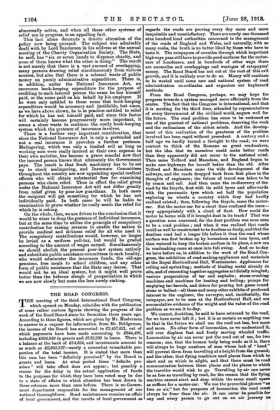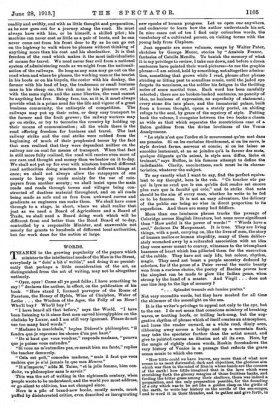THE ROAD CONGRESS.
THE meeting of the third International Road Congress, 1 which opened on Monday, coincides with the publication of some rather curious figures showing the progress of the work of the Road Board since its formation three years ago. According to these figures, which are given by Mr. Masterman in answer to a request for information from Mr. Bridgernan, the income of the Board has amounted to £3,457,021, out of which payments have been made amounting to £844,496, including £696,849 in grants and £128,239 in loans. There is a balance at the bank of £14,624, and investments amount to as much as £2,602,527—surely a somewhat remarkable pro- portion of the total income. It is stated that more than this sum has been "definitely promised" by the Board in grants and loans. At what period these " definite pro- mises " will take effect does not appear ; but possibly a reason for the delay in the actual application of funds to the purposes for which they have been voted may be due to a state of affairs to which attention has been drawn in these columns more than once before. There is no Govern- ment department responsible for the management of our national thoroughfares. Road maintenance remains an affair of local government, and the results of local government as regards the roads are proving every day more and more inequitable and unsatisfactory. There are nearly one thousand nine hundred local authorities concerned in the management of the roads of England and Wales, and naturally, with so many cooks, the broth is no better liked by those who have to taste it. The ratepayers of counties through which important highways pass still have to provide good surfaces for the motor- cars of Londoners, and in hundreds of other ways there are anomalies and overlappings and wastages of ratepayers' money. The Road Board has not cut at the root of this evil growth, and it is unlikely ever to do so. Money will continue to be wasted until some new and national system of road administration co-ordinates and organizes our haphazard methods.
From the Road Congress, perhaps, we may hope for progress towards a system managed more efficiently from the centre. The fact that the Congress is international, and that it is meeting for the third time, attended by representatives of every Government of the civilized world, augurs well for the future. The road problem has come to be reckoned as one of the greatest of national problems, deserving the work
and the enthusiasm of the ablest minds. And the develop- ment of this realization of the greatness of the problem involved has been rapid without precedent. A century and a half ago we hardly turned a thought to the road; we were content to think of the Romans as great roadmakers, but the idea that we ourselves could make better roads than they apparently did not occur to the national mind. Then came Telford and Macadam, and England began to make new highways for herself better than the old. After Telford and Macadam came the wide development of the railways, and the roads dropped back from first place in the thoughts of engineers; the future of travel was taken to be by steam and rail. And then came the re-discovery of the road by the bicycle, first with its solid tyres and afterwards with the pneumatic tyre which set half the population exploring on wheels a country which they had hardly realized existed ; then, following the bicycle, came the motor- car. But the motor-car for a short time confused the issue— very appropriately with a cloud of dust. How could the motor be borne with if it brought dust in its track ? That was a question soon answered, for the dust problem was soon seen to be a road problem ; and when it was realized that roads could as well be constructed to be dustless as dusty, and that the dustless road had a longer life before it than the road whose surface was first broken up by horseshoes and iron tyres, and then watered to keep the broken surface in its place, a new era in roadmaking came at once into full swing. And so to-day we have before us, in addition to the work of the Road Con- gress, the exhibition of road-making appliances and materials at the Royal Horticultural Hall, Westminster. Appliances for rolling and sprinkling ; methods of binding metal already in situ, and of cementing together aggregates artificially mingled; various preparations of tar and asphalte ; stone-crushing machines and machines for heating and boiling; pumps for emptying tar-barrels, and driers for pouring hot gases round atone or ballast —all these and many other exhibits of profound interest to the engineer, the surveyor, and, incidentally, the ratepayer, are to be seen at the Horticultural Hall, and are accumulative evidence of the weight and the value of the road problem as we see it to-day.
We cannot, doubtless, be said to have returned to the road', for we have never left it ; but it is as certain as anything can be that in the future we shall use the road not less, but more and more. No other form of locomotion, as we understand it, will ever displace fast and freely moving wheeled traffic. Locomotion by air can never put the road out of use, for two reasons; one, that the human body being made as it is, there will always be huge numbers of men whose lack of " head " will prevent them from travelling at a height from the ground; and the other, that flying machines need places from which to start and on which to alight, and that there must be road communication between these places and the places to which the traveller would wish to go. Travelling by air can never be as free as travelling by road, for the reason that the flying machine cannot start and stop within the same small space as suffices for a motor-car. We use the proverbial phrase "as free as air," but for purposes of locomotion the road must always be freer than the air. It can never be possible for any and every person to go out on an air journey as
readily and swiftly, and with as little thought and preparation, as he now goes out for a journey along the road. He must always have with him, or be himself, a skilled pilot ; his machine can never cost as little as a pair of boots, and be can never come out from his front door to fly as he can go out on the highway to walk where he pleases without thinking of anything more than his coat and his shoeleather. It is that freedom of the road which makes it the most individualistic of means for travel. We need never fear evil from a national system of administering roads as we might from the nationali- sation of the railways. So long as any man may go out on the road when and where he pleases, the working manor the tourist in his boots or on his bicycle, the costar with his donkey, the farmer with his load of hay, the tradesman or small business man in his cheap car, the rich man in his pleasure car, all with the same rights and the same liberties, the road cannot be anything but free. Being free, too, as it is, it must always provide what is a prime need for the life and vigour of a great business community, the antiseptic of competition. The railways may put up their rates, or deny easy transport to the farmer and the fruit grower; the railway workers may go on strike, or try to terrorize the country by bolding up their means of communication ; all the while there is the road offering freedom for business and travel. The last railway strike and the coal strike were robbed from the beginning of much of their prophesied terror by the fact that men realized that they were dependent neither on the railway nor on coal for means of transport. When that fact is still more fully realized, the road will receive even more of our care and thought and money than we bestow on it to-day. We shall not put up for ever with nineteen hundred different road authorities doing nineteen hundred different things at once; we shall not always allow the ratepayers of one county to keep up roads mainly for the use of rate- payers from another Bounty; we shall insist upon the main roads and roads through towns and villages being con- structed of dustless material throughout, and on all roads being made as safe and as free from awkward curves and gradients as engineers can make them. We shall have come through to a stage, in short, where we shall realize that just as we need a Board of Agriculture and a Board of Trade, we shall need a Board doing work which will be different from and better than the Road Board of to-day, controlled by a responsible Minister, and answerable not merely for grants to hundreds of different local authorities, but for work done for the nation at large.



























































 Previous page
Previous page